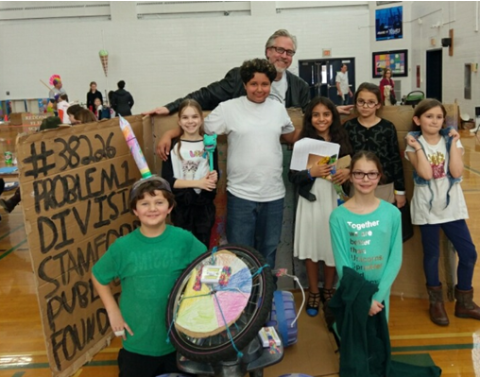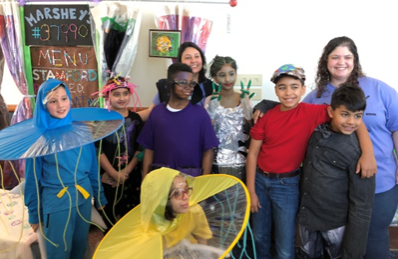Are You a Coach or Teacher?
"Odyssey teaches creative problem solving and challenges students to think outside of the box. Every year, our students inspire us with their creativity, collaboration and self-confidence.”
- Amy Beldotti, Stamford Public Schools Associate Superintendent


Coach Responsibilities
Every team needs an adult over the age of 18 to be a Coach. The nice thing about being an Odyssey Coach is that all of the work, every prop, device, prop, every line in the skit must be designed and created ONLY BY THE STUDENTS ON THE TEAM. Anything else is considered Outside Assistance, which is forbidden. This takes the pressure to be creative off the COACH!
Coaches provide supervision, organize transportation and storage of props, help the students focus on goals and develop a timeline, and keep track of registration and other paperwork. Coaches may ask questions designed to ‘stimulate’ thinking rather than ‘influence’ thinking.
Coaches ask questions like, why did the structure break there? what else could you use to make it look like a . . .? since we can’t set off real rockets in the gym, how could you simulate the look, feel, sound of real rockets? Coaches can take teams to bridges to see and discuss what makes them strong enough to hold a train. They can take them to a TV station to see how a weather program is really created. They frequently take the team to local hardware, fabric, or craft stores to look for ways to solve specific problems (to make the clock look like it’s real, to disguise the robot’s arm, or to figure out a way to make the vehicle move, to consider different glues) and for materials they might use for their device, vehicle, giraffe or unicorn.
Being a coach for an Odyssey of the Mind team can be confusing the first year, until the team has experienced a season of Odyssey, therefore, we recommend that coaches find a co-coach to share the job. It’s not required to have a co-coach, but it can make the season more fun!
Consider being a coach! We have coach training and many resources to help you along the way! Being a coach is one way to make sure your child can be part of this wonderful program. There is nothing like watching a group of students working together to figure out why the X won’t work! And when it finally works! It’s simply marvelous- for them and for the coach, because the coach made this “eureka! we did it!!” moment possible.
How do you form a team?
There are different ways to put together a team: some teams are selected by tryouts, some accept all students who show interest at a general meeting and go from there, and some create teams on a first-come, first-serve basis. Some coaches coach one team, some have two or more. The bottom line is what you are comfortable doing and what your school or community allows. The Program Guide as well as the Coaches’ Coach resources will provide you with additional help and support.
Do I need to have tryouts to pick team members?
Tryouts are one way to form a team but not the only method for choosing team members.
How does a team decide which problem to work on?
The way a team decides which problem to work on varies within your limitations (e.g., number of teams competing, skills of team members, areas of interest). One general suggestion is to share all the problems with the team and then have the team members discuss the pros and cons of each. This is a good starting point for helping a team to discover how they listen, make decisions, and solve problems. The team does have the option to change its mind and work on a different problem, but there has to be enough time to solve the problem in time for the competition.
How often do I need to meet with my team?
The frequency of team meetings is a decision made between you and your team and is often dependent upon age and experience. Getting the team together helps to keep your team on task and allows you the opportunity to teach your team various skills. Your team can also work in their own time and meetings will help them plan that time.
What things can I have parents help with?
Parents can help with driving to and from practices and stores to purchase supplies, provide snacks and practice space, as well as moral support. However, parents cannot directly help with the solution of the problem. Parents need to be reminded that Odyssey of the Mind is hands-on for kids and hands-off for adults. Be sure to explain Outside Assistance to your parents as the team begins working and remind them often – right up until the tournament.
